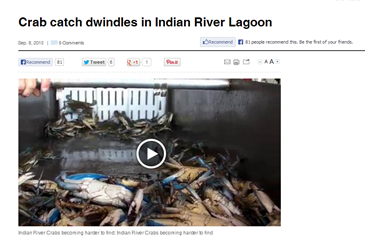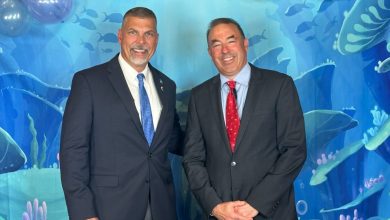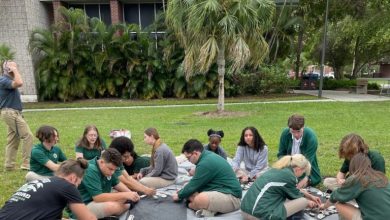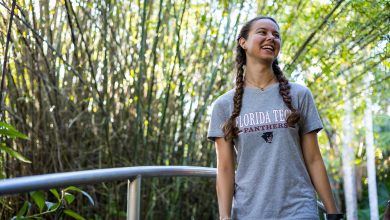Troubled Times for the Crab Populations in the Indian River Lagoon
Screenshot of a video on Florida Today about crab populations, the fishery and some of the research I’ve conducted around Sebastian Inlet.
The Indian River Lagoon, which is only a few short miles from campus, has received a lot of attention lately. The Indian River Lagoon is the nation’s most diverse estuary and has suffered significant seagrass loss (47,000 acres) due to what has been referred to as “algae super blooms.” Seagrass is a critical habitat within the lagoon, serving as a nursery for economically important fisheries such as snapper, shrimp and commercially important crabs. The National Estuary Program estimates that such pervasive seagrass decline will translate into substantial economic losses totaling $235–470 million a year.
Some of the declines reported from the algae super bloom have directly impacted crab populations. My research focuses on crab behavior and physiology with a specific focus on larval behaviors. Florida Today recently published an article about the dwindling crab populations. Some of my research was highlighted in the article. The video provided also has a brief interview about my research.
If you are interested in marine biology as a career, it is important to be involved in your community’s resources like the Indian River. It is also important to know and understand what may be causing drastic changes in populations the general public values, such as commercially important species or recreational fisheries.
The public has been trying to raise awareness for the lagoon’s problems in an attempt to get lawmakers to pass legislation to help preserve one of the most economically important natural resources in the area. The Indian River Lagoon program and several other partners have organized an event called Hands Across the Lagoon. The event is occurring simultaneously in the five counties (> 150 miles) that border the lagoon to help call attention to the deteriorating conditions. If you are in the area, you should try to attend!
Great minds think alike! Environmental science blogger Ashley wrote about the lagoon and this event, too. Read her blog post here.






